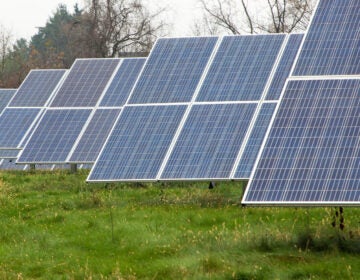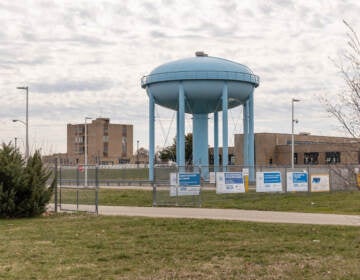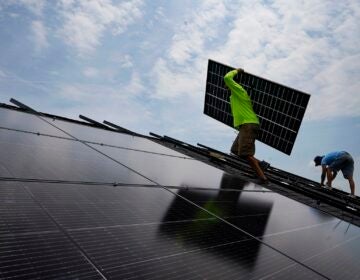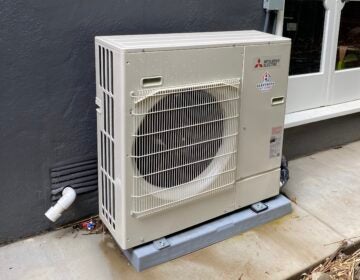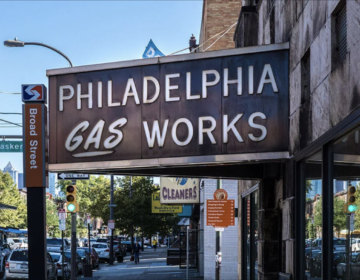This tax credit for energy-efficient home upgrades has saved Pa., Del. and N.J. millions. It’s expiring at the end of 2025
The tax credits help offset the cost of upgrades such as heat pumps, windows and insulation. They expire at the end of December.

File: The owner of a Philadelphia-based company that performs home energy audits checks for air leakages in a home in South Philly in April 2024. (Kimberly Paynter/WHYY)
This story is part of the WHYY News Climate Desk, bringing you news and solutions for our changing region.
From the Poconos to the Jersey Shore to the mouth of the Delaware Bay, what do you want to know about climate change? What would you like us to cover? Get in touch.
If you want to install a heat pump or insulation in your home, you can get a federal tax credit to help offset the cost. But you’ll need to act quickly.
That’s because the “One Big Beautiful Bill” President Donald Trump signed last month ends these tax credits early — at the end of this year.
During President Joe Biden’s term, Congress expanded and extended the tax credits that reimburse households for part of the cost of appliances and upgrades that make their homes more energy-efficient. Under the Inflation Reduction Act, these tax credits would have been available through the early 2030s.
With electricity prices on the rise, it makes sense to take advantage of them soon, said Rich Freeh, executive director at Green Building United, a Philadelphia nonprofit that advocates for climate-friendly buildings.
“If you have an older gas furnace [or] older electric resistance heating, you’re getting fuel oil delivered to your home, you’re looking to make upgrades — now is a great time to do that,” Freeh said. “There’s still opportunities to get this federal funding.”
Tax credits to make efficient appliances and weatherization cheaper
The tax credits cover investments including heat pump heating and air conditioning systems; heat pump hot water heaters; energy-efficient furnaces, boilers, central air conditioners and water heaters; new exterior windows and doors; insulation and air sealing; and home energy audits. The credits cover 30% of the costs of these investments, with annual limits for some items.
For example, a household can get up to $2,000 back on the cost of a heat pump.
IRS data shows roughly 239,000 households in Pennsylvania, Delaware and New Jersey took advantage of the energy efficient home improvement tax credits during the 2023 tax year. They saved a total of roughly $205 million.
To qualify for the tax credits, appliances and home improvements must be installed by Dec. 31.
Potential savings on electricity bills
Electricity bills in the Mid-Atlantic are rising. This is due in part to regional grid manager PJM Interconnection’s skyrocketing costs of ensuring enough electricity is produced to meet future demand. PECO customers, for example, saw an average monthly bill hike of around $8 earlier this summer, and can expect more increases over the next few years.
“Those [electricity] prices are not going down anytime soon,” Freeh said. “So I think it’s a great time to be investing in these systems that are going to save you money in the long term.”
Federally funded appliance rebates remain in limbo
The tax credits require households to make an up-front investment in home improvements, before they can redeem savings on their tax bills. This presents a problem for households who can’t afford to front the costs.
Data released by the IRS shows that nationwide, higher-income households disproportionately used the tax credits in 2023.
A different government program is meant to address this issue. Biden’s Inflation Reduction Act funded rebates to offset the cost of energy-efficiency improvements, electrification and appliances. These rebates are funded with federal dollars but administered by states.
In the final days of the Biden administration, the Department of Energy gave initial approval for Pennsylvania, Delaware and New Jersey to receive hundreds of millions of dollars in grant funding to launch their rebate programs. But months later, the rebates are still not available to consumers, as the three states await final approval from Trump’s Department of Energy.
New Jersey plans to launch its program by the end of the year, said Alonza Robertson, spokesperson for the state’s Board of Public Utilities.
Some states, including New York, Rhode Island and North Carolina, have already launched their rebate programs.
Emery Washington, deputy press secretary at the U.S. Department of Energy, declined to answer WHYY’s questions about the status of rebate funding specifically for Delaware, Pennsylvania and New Jersey.
“The Department is continuing to conduct a department-wide review to ensure all activities follow the law, comply with applicable court orders and align with the Trump administration’s priorities,” Washington wrote in an emailed statement. “The American people provided President Trump with a mandate to govern and to unleash ‘American Energy Dominance.’ The Department of Energy is hard at work to deliver on President Trump’s promise to restore affordable, reliable, and secure energy to the American people.”
WHYY is your source for fact-based, in-depth journalism and information. As a nonprofit organization, we rely on financial support from readers like you. Please give today.



